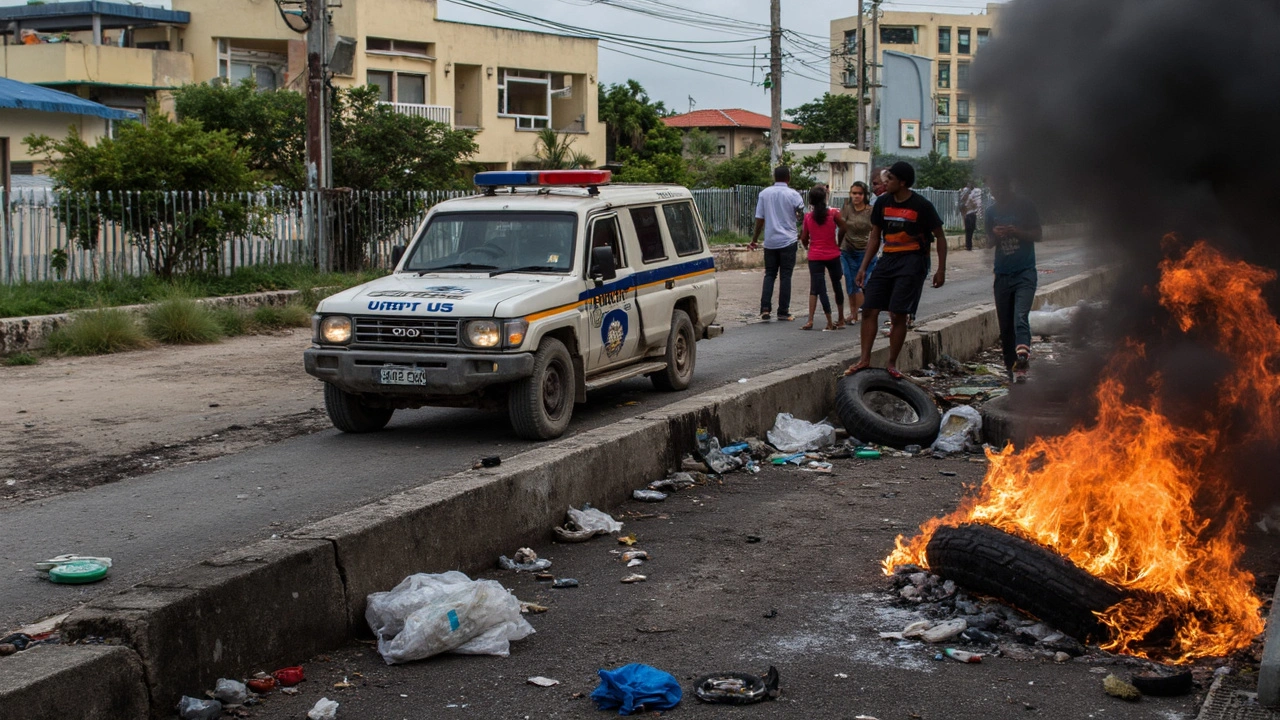Canada Steps Up Pressure on Haiti’s Power Brokers
Ottawa isn’t mincing words or measures: on March 21, 2025, the Canadian government rolled out new sanctions targeting three men it says are stoking chaos in Haiti. The move zeroes in on Dimitri Hérard, Jeantel Joseph, and Jeff Larose. Each man's name is already familiar to people following the country’s slide into unrest—allegations tie them directly to gangs and to efforts that have repeatedly sapped Haiti’s stability.
Under Canada’s Special Economic Measures (Haiti) Regulations, these individuals will find their Canadian assets inaccessible and won’t be setting foot in the country anytime soon. Officials say this is a clear stand with Haitians—trying to hold accountable the very people accused of pushing violence and violating human rights at a time when the country can barely cope with its security nightmare.
This latest round of penalties builds on earlier moves this year, which included widening the net on who can be sanctioned, cutting off permits, and expanding Canada’s arms embargo. Now, Canada is joining more closely with international efforts, echoing parts of UN resolutions that demand practical consequences for anyone fueling the crisis.

Crisis on All Fronts: Why the Sanctions Matter
The timing feels urgent. Haiti has been reeling from power struggles, brutal gang turf wars, kidnappings, and rising humanitarian pressure. Families in Port-au-Prince and beyond live with the daily reality of violence that has forced many to flee their homes or hide indoors. Aid groups are sounding alarms over food shortages and the collapse of basic health services.
If you’re wondering how far Canada is going, it’s not just words and symbolic moves. Ottawa has put more than $400 million on the table for aid and support programs in Haiti. The hope is that holding high-profile figures financially accountable—by freezing any Canadian assets they might have—will help chip away at the impunity some gang-related actors enjoy.
Still, there’s a blunt reality: the Canadian government has left its travel warnings to Haiti at the strictest possible level. Their message for Canadians is to stay away, plain and simple. Reports of violent street battles, roadblocks, and abductions keep pouring in. The implication? Even with money and sanctions, Haiti’s crisis needs far more than outside pressure to be fixed.
Officials are banking on coordinated international action—working with the UN and other partners—to push for both accountability and support. Their view is that isolating and punishing the most disruptive actors isn’t just symbolic. It’s a potential lever to edge the country back toward security and the rule of law, or at least to slow its slide into even deeper chaos.
- Canada sanctions aim to limit the financial power and free movement of those linked to Haiti’s unrest.
- The three individuals face not just asset freezes but also a ban on ever entering Canada.
- Alongside sanctions, Canada commits hundreds of millions in aid, signaling long-term involvement in the crisis response.
- Travel advisories for Haiti remain severe, reflecting ongoing violence that makes everyday life dangerous for locals and visitors alike.

Partho A.
June 4, 2025 AT 19:11Canada's latest sanctions represent a calculated diplomatic step, aiming to curtail the financial channels of key destabilizers in Haiti. By targeting individuals with alleged gang affiliations, Ottawa signals its commitment to regional stability. The measure aligns with prior efforts to broaden embargoes and support humanitarian aid. While the policy is commendable, its efficacy will depend on robust enforcement and international cooperation. Ultimately, this approach may pressure the targeted figures, but the broader socio‑political context remains complex.
Jason Brown
June 5, 2025 AT 22:58The announcement of fresh Canadian sanctions against Haiti's alleged power brokers is a noteworthy development in the ongoing saga of international intervention. First, it underscores Ottawa's willingness to leverage economic tools beyond mere rhetoric, targeting specific actors deemed responsible for fueling violence. Second, by freezing assets and banning entry, Canada attempts to disrupt the financial lifelines that enable gangs to procure weapons and sustain illicit operations. Third, this action arrives at a time when Haiti's humanitarian crisis is worsening, with food shortages and crumbling health services compounding the insecurity. Fourth, the sanctions complement a broader portfolio of aid, exceeding four hundred million dollars, indicating a multi‑pronged strategy. Fifth, the coordination with UN resolutions suggests an attempt at multilateral legitimacy, though the effectiveness of such alignment is historically mixed. Sixth, critics may argue that financial pressure alone cannot dismantle entrenched networks; nonetheless, the symbolic weight should not be dismissed. Seventh, the Canadian travel advisory reflects a real concern for citizen safety, reinforcing the seriousness of the situation. Eighth, there is a risk that sanctioned individuals will simply relocate assets offshore, thereby evading the intended impact. Ninth, the inclusion of Dimitri Hérard, Jeantel Joseph, and Jeff Larose signals a focused approach on high‑profile figures, which could yield measurable results if followed through. Tenth, the broader international community must complement these measures with on‑the‑ground peacekeeping and governance support, lest sanctions become a hollow gesture. Eleventh, the local Haitian population may perceive external pressure as either a protective shield or an unwelcome intrusion, influencing public sentiment. Twelfth, the success of these sanctions will hinge on transparency, monitoring, and the willingness to adjust tactics as the situation evolves. Thirteenth, one must consider the potential unintended consequences, such as driving illicit activities further underground. Fourteenth, the sustained commitment of Canada, both financially and diplomatically, will be crucial in the months ahead. Fifteenth, while skepticism remains, the convergence of punitive measures and aid reflects a nuanced, albeit imperfect, attempt to address Haiti's crisis.
Heena Shafique
June 7, 2025 AT 02:44If one is to applaud the veneer of decisive action, one must also interrogate its substantive depth. The Canadian sanctions, while rhetorically robust, appear to be a superficial balm on a festering wound. Targeting three individuals does little to dismantle the intricate web of patronage that sustains the gangs. Moreover, the reliance on asset freezes presumes that the named figures possess significant holdings within Canadian jurisdiction-a premise that remains unverified. Hence, the efficacy of such measures is, at best, questionable. One could argue that this approach serves more as a political flourish than a strategic solution.
Patrick Guyver
June 8, 2025 AT 06:31yeah but think about who’s pulling the strings behind the scenes… the whole thing could be a set‑up to distract from deeper agendas. i’ve seen patterns like this before where "sanctions" are just a cover for other interests. maybe the real power players are staying out of the spotlight, letting folks like the named three take the heat. just saying, stay woke.
Jill Jaxx
June 9, 2025 AT 10:18Great to see Canada stepping up. Short‑term pressure could help create space for humanitarian work.
Jaden Jadoo
June 10, 2025 AT 14:04Another move, another headline.
Traci Walther
June 11, 2025 AT 17:51Wow! 🎉 Canada is finally sending a message! This could be a turning point for Haiti 🙏💔. Let’s hope the aid follows the sanctions and brings real relief! 🌍💪
Ricardo Smalley
June 12, 2025 AT 21:38Sure, because a few frozen bank accounts are going to magically solve a decades‑long governance crisis. 🎭
Sarah Lunn
June 14, 2025 AT 01:24These sanctions are nothing but a hollow gesture-an empty promise wrapped in diplomatic rhetoric. The real issue is the absence of genuine political will to rebuild Haiti's institutions, and no amount of asset freezing will compensate for that failure.
Gary Henderson
June 15, 2025 AT 05:11Interesting take. While the intent seems solid, the execution often hits speed bumps. It’ll be worth watching how this plays out on the ground.